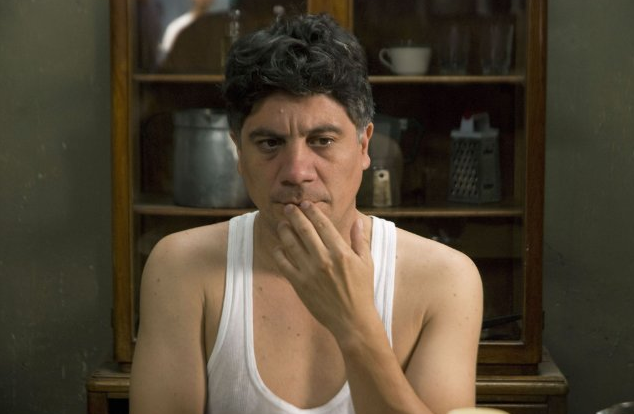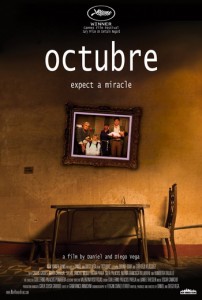
With the Cannes Film Festival beginning next week, it’s timely that Octubre, which snagged the Un Certain Regard Jury prize in 2010, is set to hit theaters in New York today. With a decidedly deadpan sense of humor Octubre is a Peruvian comedy reminiscent of the tale of Silas Marner.
In Lima, October is a time of religious celebration in which Christians pray for the change they wish to see. While the streets are full of vibrant colors, the lives of the impoverished residents are decidedly lackluster. Here, we meet Clemente (Bruno Odar), a stone-faced moneylender with a penchant for prostitutes. His is a steadfastly solitary life until one of his former paid paramours breaks into his home to leave him the fruits of her labor: a beautiful (but oft wailing) baby girl. Clemente immediately attempts to give her back, but can’t locate the missing mother. As the baby is proving a costly distraction to his business, he hires Sofia (Gabriela Velásquez), a devoted Christian and recurring client, to care for the baby while he searches for her mother. Entering this odd mix is an elderly thief hell-bent on freeing his catatonic girlfriend from the local hospital. Together these lonely people begin resemble a family, an idea Sofia warms to quickly. Indeed, as the month progresses, Sofia begins to fall for this gruff miser, but Clemente is slower to give in to this emerging connection. Will a roughly hewn family be formed by month’s end? That all depends on the film’s hard-hearted protagonist.
With a sense of humor so dry it’s often flat, Octubre rejects the whimsy its plot synopsis suggests. Rather, this film is thoroughly solemn as it depicts the gritty realities and little joys on the impoverished streets of Peru, relying on subtle visual cues for its bone-dry humor. Brother filmmakers Daniel and Deigo Vega Vidal put the emotional weight of the film on Odar’s shoulders, but his stoic portrayal left me ultimately ambivalent to his dilemma. Conversely, Velásquez is a compelling supporting character that willfully interjects herself into Clemente’s life and fights to stay there. While restrained, her performance proved poignant as she risks again and again to earn the life she craves.
Octubre is ambitious effort, leaving audiences to ponder what path the protagonist will choose up until its final scene. It’s masterfully shot and contains some truly compelling performances, but even at 83 minutes its steadfastly slow pace makes it feel long and its sense of humor be to wry to prove universal. Ultimately abundant in heart but sparing sentimentality, Octubre is an interesting commentary of human connection and family.
Octubre opens March 6 in New York City.


